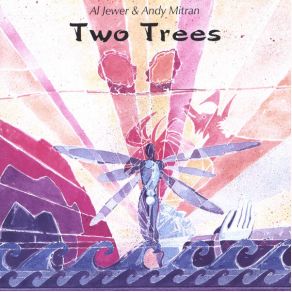Two Trees
Download links and information about Two Trees by Al Jewer. This album was released in 2003 and it belongs to New Age, Jazz genres. It contains 11 tracks with total duration of 01:03:09 minutes.

|
|
|---|---|
| Artist: | Al Jewer |
| Release date: | 2003 |
| Genre: | New Age, Jazz |
| Tracks: | 11 |
| Duration: | 01:03:09 |
| Buy it NOW at: | |
| Buy on iTunes $9.99 | |
Tracks
[Edit]| No. | Title | Length |
|---|---|---|
| 1. | Horse At Breath | 7:30 |
| 2. | Dragonfly | 5:35 |
| 3. | Coyote | 7:01 |
| 4. | Hope | 7:15 |
| 5. | Two Trees | 5:20 |
| 6. | Secret Forest | 4:23 |
| 7. | Ritual Cave | 4:30 |
| 8. | First Rays | 6:18 |
| 9. | The Long Human | 6:20 |
| 10. | Brother's Prayer | 4:43 |
| 11. | Walk to the Water | 4:14 |
Details
[Edit]When a musician claims that he/she is "beyond category," it's usually a case of wishful thinking — in other words, the musician isn't quite as unique as he/she would like to believe. But some albums really are difficult to categorize — not impossible, but difficult. Two Trees is such an album. Peaceful and contemplative yet rhythmic, this instrumental disc is somewhere between new age/world fusion, and modern Native American music — and yet, flutist Al Jewer and keyboardist Andy Mitran (the leaders of this session) aren't purists when it comes to either the new age or Native American fields. Rather, they take what they like from both and incorporate some other influences as well, including jazz and classical. This 2003 release isn't nearly as high-tech as most of the CDs that end up in the new age bins; Two Trees sounds a lot more played than programmed, and an abundance of acoustic instruments are heard alongside electric bass and electric keyboards. Nonetheless, Two Trees favors the sort of tranquility that attracts new age audiences, and at the same time, the Native American element is strong enough to make the album relevant to the contemporary Native American scene (as opposed to traditional Native American music). Two Trees uses some ethnic instruments that you would never hear at a traditional Native American powwow — such as the Aboriginal didgeridoo and the African kalimba — but then, that's the sort of experimentation that makes the neo-Native American scene so intriguing. Two Trees deserves to be placed in both the world music and new age sections of CD stores, but however you categorize Jewer and Mitran's performances, they have every reason to be proud of this risk-taking album.